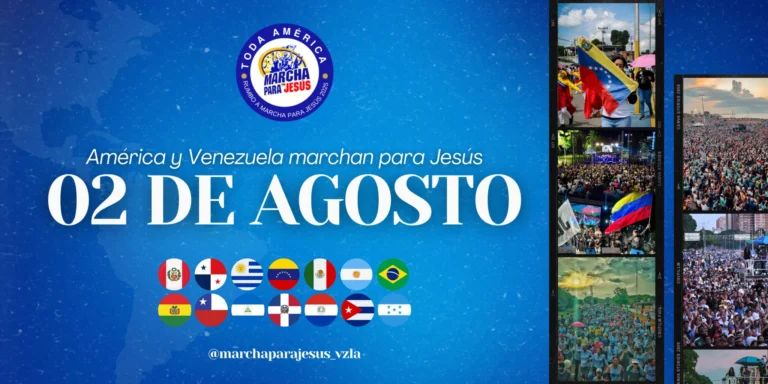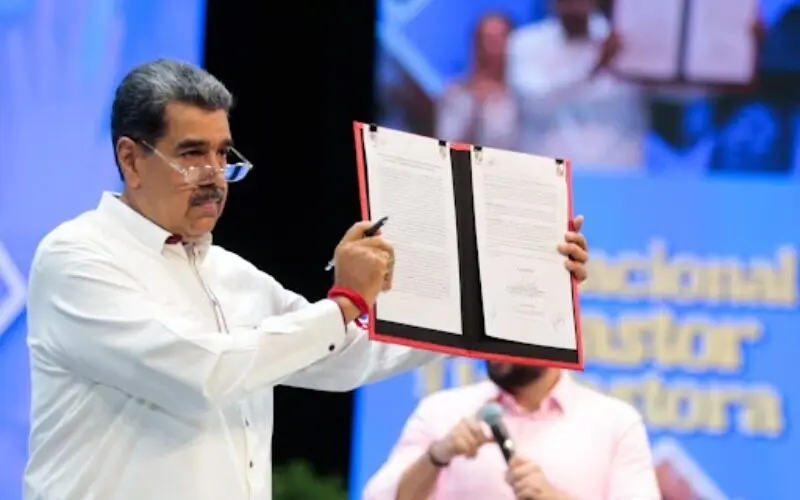7 Powerful Moments in the National March for Jesus Venezuela 2025 Amid Historic Recognition

National March for Jesus Venezuela 2025 unites thousands in Caracas and across the country 2/8/2025 Photo: yomarchoparajesus web
August 2, 2025 Hour: 12:56 pm
The National March for Jesus Venezuela 2025 marks a historic milestone after the government officially recognizes the event. Thousands march nationwide under the theme “Jesus, the nations belong to You.”
Related: Venezuela Welcomes Over 9,000 Migrants Home Through Bolivarian Return Plan Amid US Hostility
7 Powerful Moments in the National March for Jesus Venezuela 2025 Amid Historic Recognition
In a landmark moment for religious expression in Latin America, Venezuela officially recognized the first Saturday of August as the National March for Jesus Venezuela, enshrining a growing spiritual movement into national law. President Nicolás Maduro signed Presidential Decree No. 5.153 on August 1, 2025, formalizing the annual event just one day before the National March for Jesus Venezuela 2025 unfolded across the country. Under the unifying theme “Jesus, the Nations Belong to You,” the mobilization brought together tens of thousands of evangelical Christians in Caracas and 20 other states, marking what organizers called a “historic edition” of faith, unity, and public celebration.
This official recognition elevates the National March for Jesus Venezuela from a grassroots religious gathering to a state-sanctioned national observance, reflecting the increasing influence of the evangelical community in Venezuela’s social and cultural landscape. The decree emphasizes the event’s spiritual, social, and cultural significance, calling on all levels of government to support its organization and ensure public safety during the annual procession.
The move also underscores a broader trend in Latin America, where evangelical Christianity has grown rapidly over the past three decades, reshaping political, cultural, and civic life across the region.
“This is not just a march—it’s a national expression of faith, family, and hope,” said Pastor Hugo Díaz, national director of the March for Jesus Venezuela. “And now, it has the full recognition of the state.”
🔗 External Link (Dofollow): World Evangelical Alliance – Religious Freedom Report
National March for Jesus Venezuela: A Nationwide Spiritual Mobilization
The National March for Jesus Venezuela 2025 was not confined to the capital. Simultaneous events took place in 20 out of 23 states, from Maracaibo in Zulia to Ciudad Guayana in Bolívar, and from Mérida in the Andes to Maturín in the east. In each location, local churches, religious leaders, and civil authorities coordinated logistics, security, and programming, creating a cohesive national experience of worship and community.
In Caracas, the march began at 2:00 PM from two major convergence points: Centro Lido in the east and Plaza Miranda in the west. The dual columns, each composed of thousands of worshippers in coordinated yellow and white attire, slowly advanced toward the central Avenida Libertador, which had been partially closed since Friday to facilitate traffic control and public safety.
The atmosphere was one of joy, reverence, and collective energy. Participants carried banners, sang hymns, and waved flags—both national and religious—while gospel music played from mobile sound systems. Families walked together, elders prayed aloud, and youth groups danced in choreographed praise routines.
The convergence at CANTV’s headquarters, transformed into a temporary open-air sanctuary, marked the culmination of the day. There, a spiritual and cultural program unfolded, featuring sermons, music, and testimonies that drew both participants and curious onlookers.
“We are not just marching for Jesus—we are marching for Venezuela,” declared Pastor David Scarpeta during his sermon. “We march for peace, for families, for a future built on faith.”
🔗 External Link (Dofollow): Latin American Bible Association – Religious Trends 2025
Geopolitical Context: Religion, State, and Society in Latin America
The National March for Jesus Venezuela occurs within a broader regional shift in religious identity. Across Latin America, evangelical Protestantism has grown from less than 5% of the population in the 1970s to over 15–20% today, with some countries like Brazil and Guatemala exceeding 30%. In Venezuela, estimates suggest that evangelicals now represent between 15% and 20% of the population, a significant increase from previous decades.
This growth has not only transformed religious life but also influenced politics, media, and public policy. In several Latin American nations, evangelical leaders have formed political parties, lobbied for conservative social policies, and even held high-ranking government positions.
Venezuela’s official recognition of the National March for Jesus Venezuela reflects this evolving dynamic. While the country remains constitutionally secular, the decree signals a willingness by the state to engage with and legitimize religious movements that promote social cohesion and public order.
Critics, however, caution against the blurring of church and state, warning that state endorsement of a specific religious event could marginalize non-evangelical communities or set a precedent for preferential treatment. Yet, government officials have emphasized that the recognition is inclusive and symbolic, aimed at respecting freedom of expression and belief rather than promoting one denomination over others.
“This is not about favoring one religion,” said Vice President Delcy Rodríguez in a televised address. “It’s about recognizing the right of citizens to express their faith in public space—a right protected by our Constitution.”
The event also highlights how faith-based movements can serve as platforms for social stability in times of economic hardship and political tension. In Venezuela, where hyperinflation, migration, and institutional challenges have persisted for over a decade, the March for Jesus offers a rare moment of unity, purpose, and emotional relief for many.

Official Recognition: A Symbol of Unity and Spiritual Identity
Presidential Decree No. 5.153 formally establishes the first Saturday of August each year as the National Day of the March for Jesus, mandating that national, state, and municipal authorities coordinate logistics, security, and public services to ensure the event’s success. The decree assigns responsibility to the Executive Vice Presidency and the Ministry of Interior, Justice, and Peace, led by Diosdado Cabello, to oversee implementation.
The document praises the march as a “spiritual, social, and cultural phenomenon” that promotes family unity, moral values, and national peace. It also calls for the integration of artistic, musical, and educational components into future editions, reinforcing the idea that the event is not only religious but also a celebration of Venezuelan identity.
This level of institutional support is unprecedented for an evangelical event in Venezuela. While Catholic processions like Our Lady of Coromoto have long enjoyed state recognition, the formalization of an evangelical-led national observance marks a significant shift in religious inclusivity.
Church leaders have welcomed the move as a victory for religious freedom and a sign of growing respect for pluralism in public life.
“For years, we marched in faith, not knowing if we’d be supported,” said Pastor Hugo Díaz. “Today, we march with dignity, with recognition, and with the blessing of our nation.”
Faith in Motion: Music, Message, and Mass Participation
The closing ceremony at the CANTV site in Caracas was a vibrant fusion of worship, music, and inspiration. The event featured apostolic messages, prophetic prayers, and live gospel performances that kept the crowd engaged for over three hours.
Pastor David Scarpeta delivered a powerful sermon focused on national healing, spiritual awakening, and divine purpose, urging Venezuelans to “reclaim the destiny God has for our nation.” Apostolic leader Raúl Ávila followed with a message of hope and perseverance, emphasizing that “Venezuela is a land of grace, and grace is still at work.”
Musical performances elevated the emotional tone of the gathering. Jahaziel Band, a well-known Venezuelan Christian group, performed original worship songs and contemporary gospel hits. The highlight came when Funky, a popular Venezuelan Christian artist, took the stage, energizing the crowd with upbeat rhythms and lyrics centered on praise, resilience, and divine love.
The event was also a family affair, with children, youth, and elders participating in large numbers. Organizers reported that many attendees traveled from distant towns, some by bus, others on foot, to be part of the historic day.
Social media platforms were flooded with live streams, photos, and testimonials. Hashtags like #MarchaParaJesús2025, #PrimeroSábadoDeAgosto, and #JesúsLasNacionesTePertenecen trended nationally, amplifying the event’s reach beyond physical participants.
Religious Freedom and Social Impact
The National March for Jesus Venezuela is more than a religious parade—it is a statement of identity, resilience, and civic engagement. In a country where over 7 million people have emigrated since 2015, the march represents a counter-narrative of staying, believing, and rebuilding.
For many participants, the event is a spiritual anchor in uncertain times. It offers a space to pray for the nation, reconnect with community, and reaffirm personal faith.
The decree also reinforces constitutional protections for religious expression. Article 65 of the Venezuelan Constitution guarantees the right to practice any religion, and this recognition affirms that evangelical Christians can exercise their faith publicly without fear of marginalization.
Moreover, the march promotes interdenominational unity, bringing together Pentecostals, Baptists, Methodists, and independent churches under a shared vision. While theological differences exist, the event fosters solidarity and collective purpose.
Conclusion: A Nation Marching in Faith
The National March for Jesus Venezuela 2025 was a powerful convergence of faith, culture, and state recognition. With the signing of Decree No. 5.153, Venezuela has formally acknowledged the spiritual vitality and social contribution of its evangelical community.
As the sun set over Avenida Libertador, and thousands raised their hands in unison, singing “Santo, Santo, Santo,” the message was clear: this is a people who believe, who hope, and who march together.
The National March for Jesus Venezuela is no longer just an annual event—it is now a national institution, a symbol of spiritual resilience in the face of adversity, and a testament to the enduring role of faith in shaping the soul of a nation.
In a world often divided by ideology, economics, and conflict, Venezuela’s march reminds us that sometimes, the most powerful movements begin not with a protest, but with a prayer.
Author: JMVR
Source: VTV

